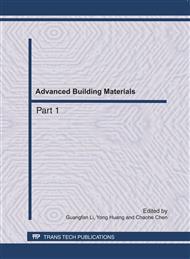p.3069
p.3074
p.3079
p.3083
p.3090
p.3098
p.3103
p.3107
p.3115
Application of Extension Theory in Evaluation of Energy Efficiency Reformation of Existing Building
Abstract:
The energy efficiency reformation of existing buildings is a very complicated system which is controlled by lots of factors. It is very important content of the energy efficiency reformation work. The evaluation system for energy efficiency reformation of existing buildings is established. The value assignment method is proposed and the rating standard is established. Based on matter-element theory and dependent function, the extension theory is applied to evaluate the effect of energy efficiency reformation of existing buildings, and the extension method for the effect evaluation is proposed. Taking a real project of energy efficiency reformation for example, based on the reasonable selection of evaluation factor, an extension model for evaluation is built. As a result, it is practical and feasible to apply the extension method to solve this kind of problems.
Info:
Periodical:
Pages:
3090-3097
Citation:
Online since:
May 2011
Price:
Сopyright:
© 2011 Trans Tech Publications Ltd. All Rights Reserved
Share:
Citation:


